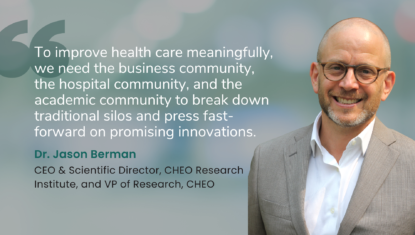12/12/2022
Ottawa, Ontario — Monday December 12, 2022

Op-ed published in the Ottawa Business Journal on Monday, December 12, 2022
Imagine the audacity to see a game-changing cancer treatment in a nuclear reactor.
Imagine the ambition to think, “I can give mobility to children through advanced robotics,” or to offer people solutions for better sleep.
Imagine undertaking, as one’s raison d’être, better personalized care journeys for patients or facilitating home care through artificial intelligence and cloud-based technologies so people can get the care they need from anywhere.
We have the opportunity to create such powerful solutions in Ottawa, both for our community and the world. Canada’s capital boasts the highest concentration of tech talent in North America at 11.6 per cent of our total workforce (ahead of Silicon Valley three years running). As an internationally recognized global tech hub, there are dozens of audacious and innovative companies changing the world for the better with exciting life sciences enterprises.
Given the current healthcare crisis, we need more — many more — of these big-thinking endeavours. And we need healthcare leaders to have their backs and help them navigate their way through the system.
In no area of healthcare is that truer than in pediatrics, or kid care. And nowhere in Canada, or even North America, is better placed to deliver on this opportunity than Ottawa.
An audacious statement? We, at the CHEO Research Institute, don’t think so. Hopefully, it is one that inspires and convenes some of this region’s big thinkers.
Innovation has driven incredible healthcare advances for generations, including a handful of notable home-grown CHEO examples, like synthetic data trailblazer Replica Analytics and Shoebox Audiometry. Sadly, these are relatively rare success stories.
Today, more than 6,200 people are employed in 134 life sciences companies in our region across the pharma-biotech, medtech and digital health sectors. These firms are bolstered by a thriving collaborative ecosystem. Eastern Ontario is home to about 6,500 researchers and clinicians, affiliated with leading universities — an extensive medical research cluster. When coupled with top hospitals, post-secondary institutions and innovation hubs such as Invest Ottawa, it is a powerful combination of expertise and infrastructure that we need to harness.
Smart, passionate people in healthcare roles are not lacking great ideas. Where they’ve struggled in too many cases is bringing that idea or product through to commercialization — bringing their ideas to fruition and to market.
The current crisis in pediatric health stems from years of under-funding and under-resourcing. We need to right-size our pediatric system to meet the evolving needs of our fast-growing population of children and adolescents. These youth represent our future.
We also need to rethink how we deliver care, how we incorporate research and innovation clinically, and how we produce better outcomes.
That will almost certainly mean bridging gaps between private companies and public-sector health institutions, like our beloved CHEO. We need to work across sectors and form partnerships to find creative solutions and close healthcare gaps.
The CHEO Research Institute’s recent CHEO Bears’ Den pitch event is an example of what is needed: healthcare innovators paired with investment and start-up leaders.
But we need to spark and catalyze innovation on a much grander scale to tackle our biggest healthcare challenges in new ways.
We need more traditional research like discovery science and clinical trials and we need greater research funding in Canada to undertake these studies competitively on the world stage. But we also need more creative approaches to foster innovation and research partnerships that redefine the traditional role of a research institution and an academic health centre.
The CHEO Research Institute wants to play a key role in linking innovation concepts with real-life care environments to safely validate technology and perfect products destined for clinical practice.
Our community of “health people,” “tech people” and “money people” can pioneer new ways of realizing promising ideas and solutions. By working together, we can move the needle, find solutions and make a real difference.
Today, Canada spends roughly $300 billion on healthcare for 38 million people delivered by fewer than 90,000 physicians.
Our area receives roughly $380 million per year for health research that is widely spread. Just a tiny fraction of that research ever makes it to the product prototype stage. We can do better.
To improve healthcare meaningfully, we need the business community, the hospital community and the academic community to break down traditional silos and press fast-forward on promising innovations.
Mayor Mark Sutcliffe won office, in part, on a promise to attract more family doctors to Ottawa. Imagine if we could also attract new medtech innovators and pair them with professionals embedded in healthcare and research to get great ideas realized. That is what the CHEO Research Institute is striving to do: create a rich support ecosystem designed for healthcare innovators. But we cannot do it alone.
Working together in new ways, we have better shots at success — with more efficient and cost-effective care and new and better solutions to the challenges of today and tomorrow as returns on our investments.
Imagine the audacity of innovating our way out of crisis mode and toward the best lives for all our young people. Don’t our kids deserve that and more?
Jason Berman is CEO and scientific director at the CHEO Research Institute and vice-president of research at CHEO.
